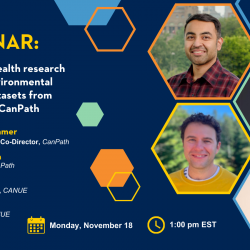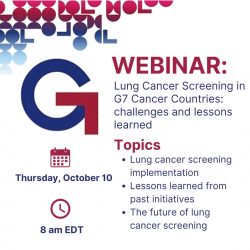CanPath Webinar: Advancing cardiometabolic health research in Canada
Building on CAHHM: Advancing cardiometabolic health research in Canada Date: February 5, 2026 Time: 1pmAST Location:us02web.zoom.us About the webinar In this session, the CAHHM team will share key findings from the initial Canadian Alliance for Healthy Hearts and Minds (CAHHM) study and introduce the objectives and design of the recontact phase. Building on the foundation of Canada’s largest multi-ethnic cardiovascular imaging cohort, the presentation will explore how new analyses and collaborations will advance our understanding of cardiometabolic health and support improved prevention and care strategies nationwide. About the presenter Dr. Sonia Anand is a Professor of Medicine and Epidemiology at McMaster University, is the Director of the Chanchlani Research Centre focused on Health Equity Research and is a Senior Scientist at the Population Health Research Institute. Dr. Anand received a Doctor of Medicine from McMaster in 1992, Internal Medicine Training at McMaster and a Fellowship of the Royal College of Physicians and Surgeons of Canada in 1996. After additional clinical training in thrombosis and in vascular medicine at Harvard’s Brigham and Women’s Hospital, Dr. Anand works as a vascular medicine specialist at Hamilton Health Sciences and McMaster University. Dr. Anand further received her Master’s in Clinical Epidemiology at McMaster in 1996 and Ph.D. in Health Research Methodology at McMaster in 2002. She held two terms as a Tier 1 Canada Research Chair and holds the Heart and Stroke Foundation of Ontario/Michael G. DeGroote Chair in Population Health Research. Her present research focuses upon the environmental and genetic determinants of vascular disease in populations of varying ancestral origin, women and cardiovascular disease. Dr. Anand’s work is widely published amongst academic journals with over 500 scientific publications, and in 2019 she was inducted as a Fellow to the Canadian Academy of Health Sciences. In 2020 she received the Lifetime Achievement Award for Diabetes from the South Asian Health Foundation, UK. In 2021, Dr. Anand joined the National Heart and Stroke Foundation as a Board member. In 2022, Dr. Anand received the Margolese National Heart Disorders Prize and was inducted as a Fellow of the Royal Society of Canada. In 2023, she was awarded the YWCA Women of Distinction award. As of July 2023, Dr. Anand has taken on the role of Associate Vice-President, Global Health. In 2024, Dr. Anand was awarded the Jack Hirsh Award for Outstanding Academic Achievement from the Department of Medicine at McMaster University and the Robert Beamish Leadership Award at the 26th Annual Naranjan Dhalla Cardiovascular Awards Day. In 2025, Dr. Anand was awarded the King Charles III’s Coronation Medal for Community Service. Register for the webinar








